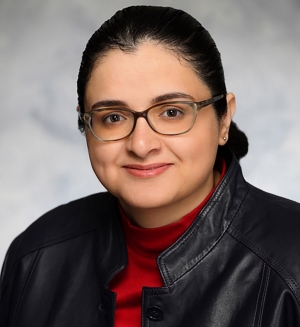When Ghada Koleilat transferred from the American University of Beirut in Lebanon to Concordia University, her love for engineering and science reignited.
“Coming to Concordia re-energized me,” she says. “Sub-specializing in electronics made me realize my passion for the subject and helped me understand the physics behind devices, which is the foundation of my current research.”
While at Concordia, Koleilat quickly realized she was interested in teaching after working as a marker and teaching assistant in the Department of Electrical and Computer Engineering. She also enjoyed her course on semiconductor physics, a class she now teaches at Dalhousie University.
“My time at Concordia gave me a great foundation and helped form my passion for research in my field,” says Koleilat.
Following her studies at Concordia, Koleilat completed her master’s and doctorate degrees in electrical engineering at the University of Toronto. While there, she participated in a chemistry-based project centered on lead salt quantum dots. With skill and determination, she created stable photovoltaic devices that broke the established performance record for this new class of materials. Previously, these devices degraded within minutes of air exposure.
Koleilat hypothesized that the problem lay in the organic molecules and developed an entirely new device and processing architecture. Her work led to an elegant solution that created a path to enhanced electronic transport. Not only did she design a new material and process, she also built it for the first time. Her research now has more than 250 citations and was one of the 10 most-cited ACS Nano articles for four years running.
As a prestigious Banting Fellow, Koleilat went on to do her postdoctoral work at Stanford University, where her research focused on the selective sorting of semiconducting carbon nanotubes. Relying on her expertise, she evaluated their use as active sensitizers in simple bilayer photovoltaic junctions.
Today, Koleilat is an assistant professor at Dalhousie University, where she is currently cross-appointed in the Departments of Electrical and Computer Engineering, Process Engineering and Applied Science, and Physics and Atmospheric Science. She is also the principal investigator of the Koleilat Research Group, a seven-member team that examines solution-processing techniques for their unparalleled potential in low cost, flexible, stretchable and large surface area applications for nanomaterials.
Koleilat’s goal for the research group is to establish a state-of-the-art laboratory for carbon based energy converters. The team draws on expertise from electrical, chemical, mechanical and materials science engineering, as well as physics and chemistry.
Reflecting on her time as an undergrad, Koleilat notes how her Ivy League experiences often compare to the calibre of work she had seen at Concordia.
“I will always be proud that I graduated from Concordia University. It was a fantastic place to do a bachelor’s in engineering,” she says. “The quality of the professors and the resources available for undergraduate students are not common everywhere — even in larger institutions.”

 Ghada Koleilat (BEng 06), assistant professor at Dalhousie University, teaches the same courses she once loved as a Concordia undergrad.
Ghada Koleilat (BEng 06), assistant professor at Dalhousie University, teaches the same courses she once loved as a Concordia undergrad.